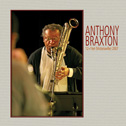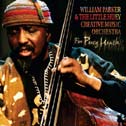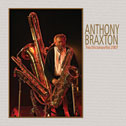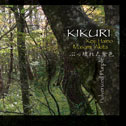Home » Jazz Articles » Record Label Profile » Les Disques Victo
Les Disques Victo
We average five to six CDs a year... People who are living off their labels have to do 20-25 a year. I work full time on the fest and part-time on the label.
—Michel Levasseur
Levasseur isn't one to trumpet anniversaries, but nevertheless this year marks the 25th Festival Internationale de Musique Actuelle de Victoriaville and the 22nd of the Victo label. Taken together, they make a strong argument against classification: jazz, rock, noise and electronic music all come together under the banner musique actuelle—literally "music of the now."
 If that disregard for divisions is more of a European programming model than North American, it makes sense to say that Levasseur imported it, carrying the concept with him from the UK. He lived in Scotland for most of the 1970s, where he saw performances by Derek Bailey, Evan Parker and the seminal improv-rock band Henry Cow. He also encountered the German Moers and FMP festivals and record labels, and discovered Incus, the label founded by Bailey and Parker. With the inspirations of both artists and business models, he returned to Canada to start building something at home. In December of 1983 the first festival was held: 13 acts including sets by Skeleton Crew (the duo of Tom Cora former Henry Cow member Fred Frith) and Quebecois guitarist René Lussier. In 1986, Frith and Lussier played together at the festival (with guests including Henry Cow percussionist Chris Cutler); That set became the first Victo release.
If that disregard for divisions is more of a European programming model than North American, it makes sense to say that Levasseur imported it, carrying the concept with him from the UK. He lived in Scotland for most of the 1970s, where he saw performances by Derek Bailey, Evan Parker and the seminal improv-rock band Henry Cow. He also encountered the German Moers and FMP festivals and record labels, and discovered Incus, the label founded by Bailey and Parker. With the inspirations of both artists and business models, he returned to Canada to start building something at home. In December of 1983 the first festival was held: 13 acts including sets by Skeleton Crew (the duo of Tom Cora former Henry Cow member Fred Frith) and Quebecois guitarist René Lussier. In 1986, Frith and Lussier played together at the festival (with guests including Henry Cow percussionist Chris Cutler); That set became the first Victo release. "We certainly didn't see the label as a part of the whole thing when we started the festival," Levasseur said. "We were really not sure what musique actuelle was going to be, but we knew we didn't want it to be a jazz festival, a rock festival or a classical festival. After three or four years we started to think of the label as a way to extend our work. With the label we could send a CD to the USA, England, France, and people would begin to know about the festival."
"We certainly didn't see the label as a part of the whole thing when we started the festival," Levasseur said. "We were really not sure what musique actuelle was going to be, but we knew we didn't want it to be a jazz festival, a rock festival or a classical festival. After three or four years we started to think of the label as a way to extend our work. With the label we could send a CD to the USA, England, France, and people would begin to know about the festival." Although still strongly identified with the festival, Victo the label is no longer a part of Productions Platforme, the nonprofit organization that runs the festival. Hoping to secure a part of his work that could take him into retirement, Levasseur broke the label off from the parent organization.
"I was running the label, making all the decisions about content and promotion," he said. "It was more my responsibility, and the festival is the work of a lot of people. I found out that when I left the festival I would have nothing."
Running a record label, however, isn't the retirement plan it once was. Sales are down from an average of 1,300 per title five years ago to 1,100 now, and the number of new titles per year isn't enough to constitute a second career, or a pension.
"We average five to six CDs a year," Levasseur said. "People who are living off their labels have to do 20-25 a year. I work full time on the fest and part-time on the label. It's kind of a hobby, really."
Declining sales aren't the only challenge facing the label. Until 2004, the Canadian Broadcasting Corporation was taping 10 to 15 concerts at the festival each year for radio broadcast, and those tapes were made available to the label for possible release. Now the label must shoulder the costs of making releasable recordings. While all concerts are recorded from the soundboard, only four to eight are taped for CD release. The up side is that the concerts which are recorded for release are now multi-tracked, as opposed to the two-channel recordings made by the CBC.
 The CBC was also less interested in rock and electronic concerts, so without them the label has broadened its scope. The last couple of years have seen releases by the New York sound tribe No Neck Blues Band, a pairing of noise pioneers Borbetomagus and Hiokaidan and a turntable duo by Candians Kid Koala and Martin Tetrault alongside more jazz-leaning records by Anthony Braxton, Satoko Fujii and William Parker. "I don't think the label is representative of the fest completely," Levasseur said. "There's a bit more jazz on the label."
The CBC was also less interested in rock and electronic concerts, so without them the label has broadened its scope. The last couple of years have seen releases by the New York sound tribe No Neck Blues Band, a pairing of noise pioneers Borbetomagus and Hiokaidan and a turntable duo by Candians Kid Koala and Martin Tetrault alongside more jazz-leaning records by Anthony Braxton, Satoko Fujii and William Parker. "I don't think the label is representative of the fest completely," Levasseur said. "There's a bit more jazz on the label."And while the festival can attract some of the bigger names in the varying stripes of avant-garde music, those shows aren't always available to the label. "You can't have the John Zorns and the Mike Pattons because they all have their own labels, so the label does not have all the big names," Levasseur said. "I would like the label to be as wide as the festival, but it makes it very difficult with distribution. I have to target different markets all the time. But the mixing of the rock and jazz and improv scenes has rejuvenated the scene. It doesn't bring more people to the festival or the label, but it brings new energy."
 That overlapping of markets, however, is what keeps the festival and label exciting. A case in point came with Braxton's return to Victoriaville three years ago. To date, Victo has released eight CDs by Braxton, more than any other artist on the label. Levasseur remembers his 1992 quartet concert as "one of the best concerts ever." But Braxton wasn't back at the festival for another 12 years, until the controversial 2005 festival partially curated by Thurston Moore. That year, Braxton did a duo with Frith, played with his sextet and made an unscheduled appearance with the noise group Wolf Eyes. Braxton appeared again in 2007, with his trio and 12tet. All five sets have been released.
That overlapping of markets, however, is what keeps the festival and label exciting. A case in point came with Braxton's return to Victoriaville three years ago. To date, Victo has released eight CDs by Braxton, more than any other artist on the label. Levasseur remembers his 1992 quartet concert as "one of the best concerts ever." But Braxton wasn't back at the festival for another 12 years, until the controversial 2005 festival partially curated by Thurston Moore. That year, Braxton did a duo with Frith, played with his sextet and made an unscheduled appearance with the noise group Wolf Eyes. Braxton appeared again in 2007, with his trio and 12tet. All five sets have been released."Braxton at the moment is really, really strong creatively, so it was important to bring him back to the festival," Levasseur said. "I wanted to record the trio, but I didn't really want to do the 12tet because he just had the box set [9 Compositions (Iridium) on Firehouse 12], but he convinced me to do it and I convinced him to stop after 60-70 minutes and not have a double CD. I'm very glad we did it because not everyone can buy the box set and listen to it for two months."
 With the recent Braxton releases, and a hot-off-the-presses duo between Keiji Haino and Masami Akita (better known as noise artist Merzbow), the label boasts 110 titles. This year will also see the release of a Michael Snow/Alan Licht/Aki Onda trio and a Matière Sonore concert incorporating field recordings made in Victoriaville, both from the 2007 festival. But that first release remains the best selling, at about 5,500 copies moved. All of the releases remain available, but as title go out of stock, Levasseur is considering offering paid downloads rather than reprinting—an option he's not embracing warmly.
With the recent Braxton releases, and a hot-off-the-presses duo between Keiji Haino and Masami Akita (better known as noise artist Merzbow), the label boasts 110 titles. This year will also see the release of a Michael Snow/Alan Licht/Aki Onda trio and a Matière Sonore concert incorporating field recordings made in Victoriaville, both from the 2007 festival. But that first release remains the best selling, at about 5,500 copies moved. All of the releases remain available, but as title go out of stock, Levasseur is considering offering paid downloads rather than reprinting—an option he's not embracing warmly."For me it's very important to have the human feeling of doing the music," he said. "If there is no format, you don't need a producer, the musician can just put it up on their website. When you do a concert you have memories of the concert. When you do a CD, you have something, a work of art."
"I like making bread," he added. "I don't want to eat y bread out of pills. I want to eat real bread. If I make a CD, I want it to be real, not just in the air."
Tags
PREVIOUS / NEXT
Support All About Jazz
 All About Jazz has been a pillar of jazz since 1995, championing it as an art form and, more importantly, supporting the musicians who make it. Our enduring commitment has made "AAJ" one of the most culturally important websites of its kind, read by hundreds of thousands of fans, musicians and industry figures every month.
All About Jazz has been a pillar of jazz since 1995, championing it as an art form and, more importantly, supporting the musicians who make it. Our enduring commitment has made "AAJ" one of the most culturally important websites of its kind, read by hundreds of thousands of fans, musicians and industry figures every month.

























